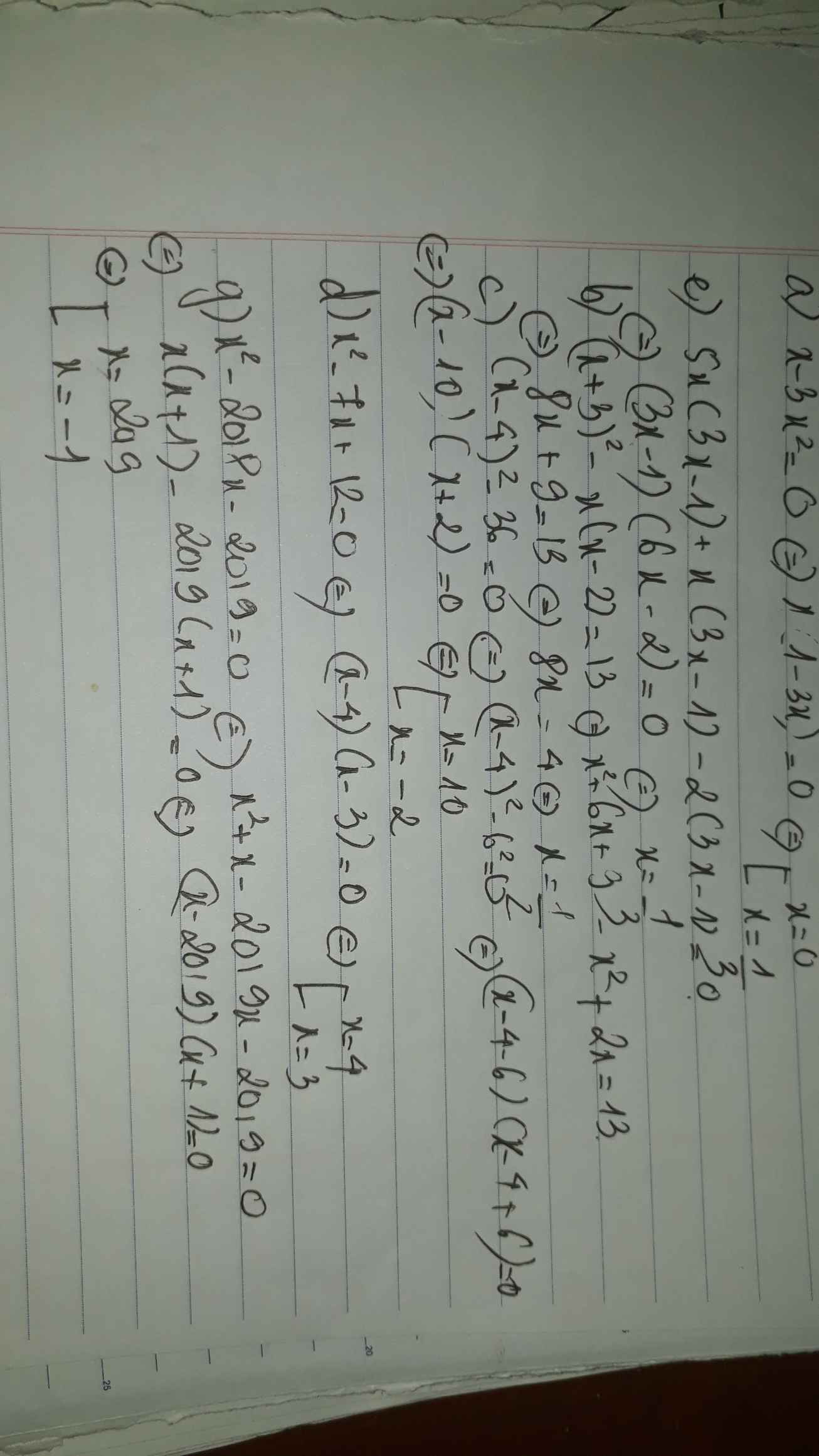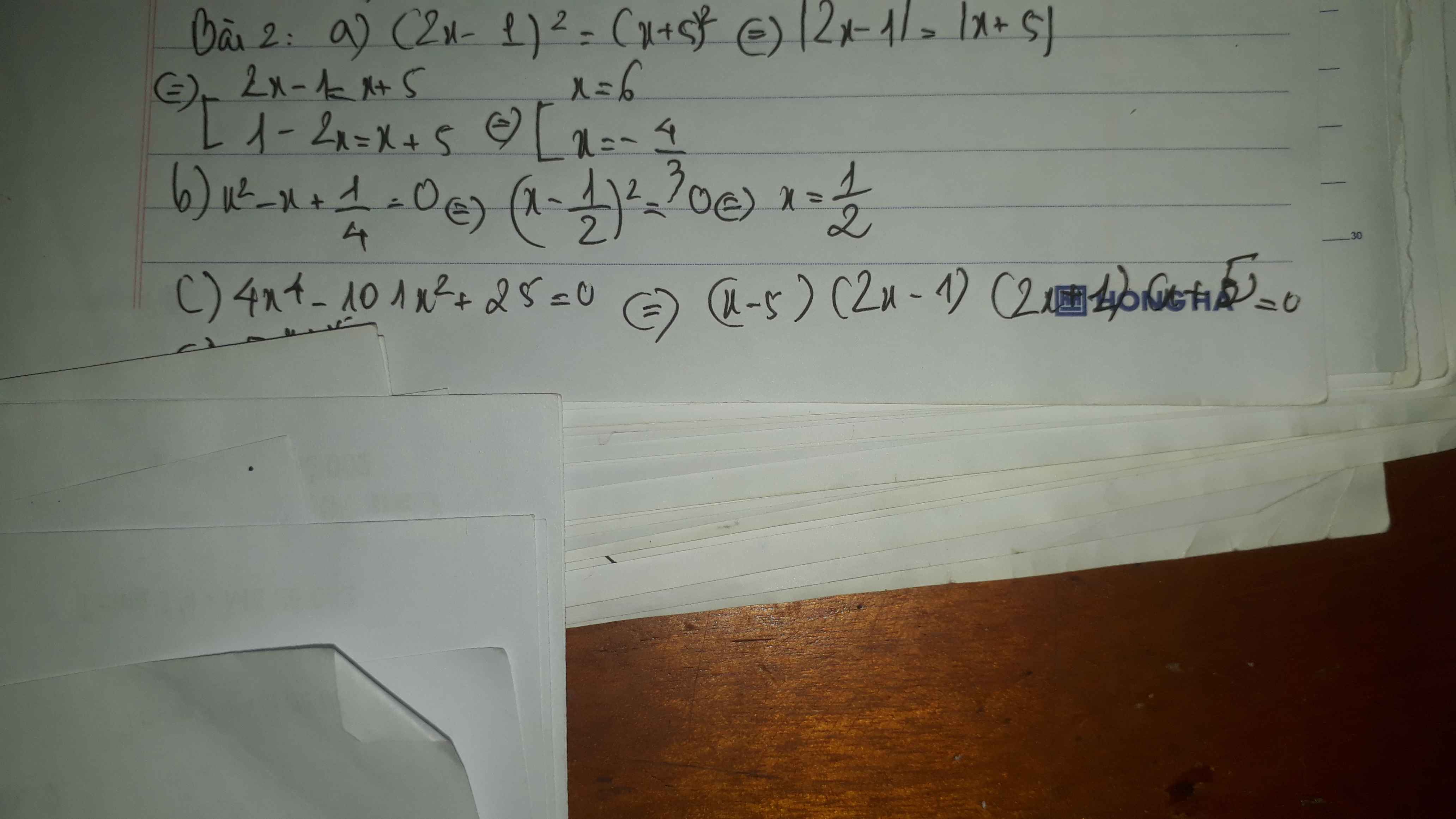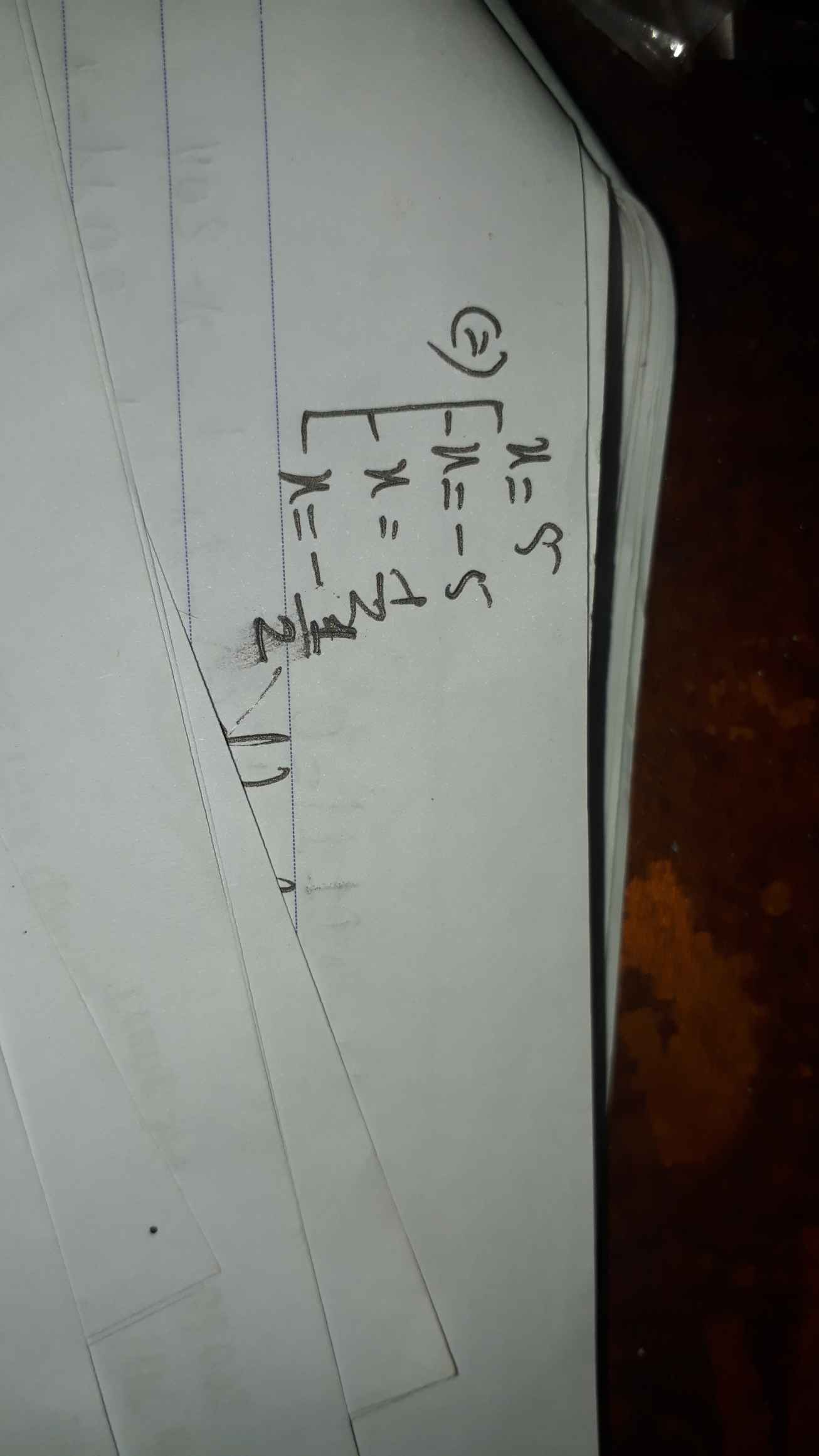
Hãy nhập câu hỏi của bạn vào đây, nếu là tài khoản VIP, bạn sẽ được ưu tiên trả lời.


a: \(=6x^3-10x^2+6x\)
b: \(=-2x^4-10x^3+6x^2\)
c: \(=-x^5+2x^3-\dfrac{3}{2}x^2\)
d: \(=2x^3+10x^2-8x-x^2-5x+4=2x^3+9x^2-13x+4\)


Bài 1:
a) (3x - 2)(4x + 5) = 0
<=> 3x - 2 = 0 hoặc 4x + 5 = 0
<=> 3x = 2 hoặc 4x = -5
<=> x = 2/3 hoặc x = -5/4
b) (2,3x - 6,9)(0,1x + 2) = 0
<=> 2,3x - 6,9 = 0 hoặc 0,1x + 2 = 0
<=> 2,3x = 6,9 hoặc 0,1x = -2
<=> x = 3 hoặc x = -20
c) (4x + 2)(x^2 + 1) = 0
<=> 4x + 2 = 0 hoặc x^2 + 1 # 0
<=> 4x = -2
<=> x = -2/4 = -1/2
d) (2x + 7)(x - 5)(5x + 1) = 0
<=> 2x + 7 = 0 hoặc x - 5 = 0 hoặc 5x + 1 = 0
<=> 2x = -7 hoặc x = 5 hoặc 5x = -1
<=> x = -7/2 hoặc x = 5 hoặc x = -1/5

\(a,2\left(x-5\right)=2\left(2x-3\right)\)
\(\Leftrightarrow2x-10-4x+6=0\)
\(\Leftrightarrow-2x=4\)
\(\Leftrightarrow x=-2\)
\(-3x^2-7=0\Leftrightarrow x^2=-\dfrac{7}{3}\Leftrightarrow\) pt vô nghiệm
Vậy 2 pt ko tương đương
\(b,\dfrac{2x-3}{5}-\dfrac{7x-2}{4}=3\)
\(\Leftrightarrow4\left(2x-3\right)-5\left(7x-2\right)-3.20=0\)
\(\Leftrightarrow8x-12-35x+10-60=0\)
\(\Leftrightarrow-27x=62\)
\(\Leftrightarrow x=-\dfrac{62}{27}\)
\(x^2-4x-4=0\Leftrightarrow\left(x-2\right)^2=0\Leftrightarrow x=2\)
Vậy 2 pt ko tương đương

\(1,\\ a,=3x^3-2x^2+5x\\ b,=2x^3y^2+\dfrac{2}{9}x^4y^2-\dfrac{1}{3}x^2y^3\\ c,=x^2-2x+6x-12=x^2+4x-12\\ 2,\\ a,\Rightarrow6x-9+4-2x=-3\\ \Rightarrow4x=2\Rightarrow x=\dfrac{1}{2}\\ b,\Rightarrow5x-2x^2+2x^2-2x=13\\ \Rightarrow3x=13\Rightarrow x=\dfrac{13}{3}\\ c,\Rightarrow5x^2-5x-5x^2+7x-10x+14=6\\ \Rightarrow-8x=-8\Rightarrow x=1\\ d,\Rightarrow6x^2+9x-6x^2+4x-15x+10=8\\ \Rightarrow-2x=-2\Rightarrow x=1\)
\(3,\\ A=2x^2+x-x^3-2x^2+x^3-x+3=3\\ B=6x^2-10x+33x-55-6x^2-14x-9x-21=-76\)

\(a,=4x^2+3xy-y^2+4xy-4x^2=7xy-y^2\\ b,=x^2-9-x^3+3x+x^2-3=-x^3+2x^2+3x-12\\ c,=-2x^2+12x-18+5x^2+4x-1=3x^2+16x-19\\ d,=8x^3+1-3x^3+6x^2=5x^3+6x^2+1\\ e,=\left(3x^2+4x+15x+20\right):\left(3x+4\right)\\ =\left(3x+4\right)\left(x+5\right):\left(3x+4\right)\\ =x+5\\ f,=\left(x^3+4x^2-3x+3x^2+12x-9+3x+3\right):\left(x^2+4x-3\right)\\ =\left[\left(x^2+4x-3\right)\left(x+3\right)+3x+3\right]:\left(x^2+4x-3\right)\\ =x+3\left(dư.3x+3\right)\)

\(a,=6x^2+23x+21-\left(6x^2+23x-55\right)\\ =76\left(đpcm\right)\\ b,=3x^4+6x^3+9x^2-2x^3-4x^2-6x+x^2+2x+3-4x^3+4x-3x^4-6x^2\\ =3\left(đpcm\right)\)

a: \(=\dfrac{x^3\left(2x-1\right)+2\left(2x-1\right)}{2x-1}=x^3+2\)
b: \(=\dfrac{2x^3-4x^2+3x^2-6x+x-2}{x-2}=2x^2+3x+1\)
d: \(=\dfrac{x^4-2x^3+3x^2+2x^3-4x^2+6x-x^2+2x-3}{x^2-2x+3}=x^2+2x-1\)
 Bài 1.
Bài 1.


A= -(3x2-4x+2015)
mak 3x2-4x+2015= \(\sqrt{3^2}-\sqrt{3}.\frac{2}{\sqrt{3}}.2+\frac{4}{3}+2015-\frac{4}{3}\)
TỚi đây ta có hằng đẳng thức = > giá trị của biểu thức \(3x^2-4x+2015\ge\frac{6041}{3}\)
=> \(A\le-\frac{6041}{3}\)